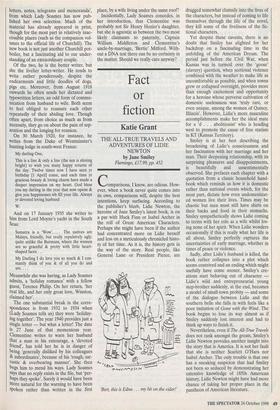Fact or fiction
Katie Grant
THE ALL-TRUE TRAVELS AND ADVENTURES OF LIDIE NEWTON by Jane Smiley Flamingo, £17.99, pp. 452 Comparisons, I know, are odious. How- ever, when a book never quite comes into its own, comparisons, will, despite the best intentions, keep surfacing. According to the publisher's blurb, Lidie Newton, the heroine of Jane Smiley's latest book, is on a par with Huck Finn or Isabel Archer in the roll of Great American Characters. Perhaps she might have been if the author had concentrated more on Lidie herself and less on a meticulously chronicled histo- ry of her time. As it is, the history gets in the way of the story. Real people, like General Lane or President Pierce, are 'Bert, this is Edna. . . my bit on the cider!' dragged somewhat clumsily into the lives of the characters, but instead of coming to life themselves through the life of the novel, they kill some of the liveliness of the fic- tional characters.
Yet despite these caveats, there is no doubt that Smiley has alighted for her backdrop on a fascinating time in the unfolding of the American Dream. The period just before the Civil War, when Kansas was in turmoil over the 'goose' (slavery) question, when sectional violence combined with the weather to make life as uncomfortable as possible, and when towns grew or collapsed overnight, provides more than enough excitement and opportunity for a heroine whose perverse cultivation of domestic uselessness was 'truly rare, or even unique, among the women of Quincy, Illinois'. However, Lidie's more masculine accomplishments make her the ideal mate for a 'd . . . abolitionist' who is heading west to promote the cause of free statism in KT (Kansas Territory).
Smiley is at her best describing the broadening of Lidie's consciousness and her fascination with her marriage and her man. Their .deepening relationship, with its surprising pleasures and disappointments, is beautifully and unsentimentally observed. She prefaces each chapter with a quotation from a classic household hand- book which reminds us how it is domestic rather than national events which, for the most part, dictate how even undomesticat- ed women live their lives. Times may be chaotic but men must still have shirts on their backs and food in their stomachs. Smiley sympathetically shows Lidie coming to terms with her role as a wife whilst los- ing none of her spirit. When Lidie wonders occasionally if this is really what her life is all about, Smiley perfectly captures the uncertainties of early marriage, whether in times of peace or violence.
Sadly, after Lidie's husband is killed, the book rather collapses into a plot which seems contrived and an ending which might usefully have come sooner. Smiley's cre- ations start behaving out of character — Lidie's wild and entrepreneurial young step-brother suddenly, at the end, becomes a model of small-town probity — and some of the dialogue between Lidie and the southern belle she falls in with feels like a poor imitation of Gone with the Wind. The book begins to lose its way almost as if Smiley suddenly lost., interest and had to think up ways to finish it.
Nevertheless, even if The All-True Travels does not rank amongst the greats, Smiley's Lidie Newton provides another insight into the story that is America. It is not her fault that she is neither Scarlett O'Hara nor Isabel Archer. The only trouble is that one has a sneaking suspicion that had Smiley not been so seduced by demonstrating her extensive knowledge of 1850s American history, Lidie Newton might have had more chance of taking her proper place in the pantheon of American literature.


















































































 Previous page
Previous page